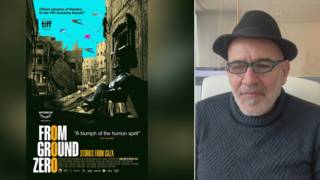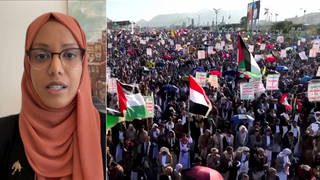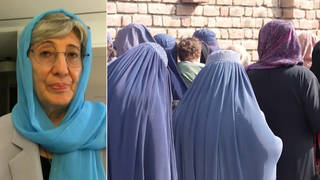
Related
Guests
- Ayesha JalalMary Richardson professor of history at Tufts University and the Fletcher School. She was a close friend of Asma Jahangir. She is the author of several books, including, most recently, The Struggle for Pakistan: A Muslim Homeland and Global Politics.
On Sunday, in Lahore, Pakistan, the world-renowned Pakistani human rights lawyer and activist Asma Jahangir died suddenly at the age of 66. For decades, Jahangir has been a leading advocate for women, minorities and democracy in Pakistan. In 1983, she was imprisoned for her work with the Movement to Restore Democracy during the military rule of General Zia ul-Haq. Later, in 2007, she was put under house arrest for helping lead a lawyers’ protest movement that helped oust military leader Pervez Musharraf. As one of Pakistan’s most powerful lawyers, she founded the country’s first legal aid center in 1986, served as the first female president of the Supreme Court Bar Association of Pakistan and was the U.N. special rapporteur for human rights, extrajudicial killings and religious freedoms. Democracy Now! interviewed Asma Jahangir in 2007 and 2016. Click here to watch Asma Jahangir’s full speech when she accepted the Right Livelihood Award in 2014. For more on her extraordinary life, we speak with her close personal friend, Tufts University professor Ayesha Jalal.
Transcript
AMY GOODMAN: This is Democracy Now! I’m Amy Goodman, with Juan González.
JUAN GONZÁLEZ: We end today’s show by looking at the extraordinary life of world-renowned Pakistani human rights lawyer and activist Asma Jahangir, who died on Sunday in Lahore at the age of 66. For decades, Jahangir has been a leading advocate for women, minorities and democracy in Pakistan. In 1983, she was imprisoned for her work with the Movement to Restore Democracy during the military rule of General Zia ul-Haq. Later, in 2007, she was put under house arrest for helping lead a lawyers’ protest movement that helped oust military leader Pervez Musharraf. Asma Jahangir was also the founding chairwoman of the Human Rights Commission of Pakistan. She served repeatedly as a U.N. rapporteur on human rights, extrajudicial killings and religious freedom. At the time of her death, she was the U.N. special rapporteur on the situation of human rights in Iran.
AMY GOODMAN: On Sunday, the United Nations Secretary-General António Guterres said in a statement, “We have lost a human rights giant.” As one of Pakistan’s most powerful lawyers, Asma Jahangir founded Pakistan’s first legal aid center in 1986, went on to serve as the first female president of the Supreme Court Bar Association of Pakistan. This is Asma Jahangir, speaking in a video produced by the Right Livelihood Awards, which she won in 2014.
ASMA JAHANGIR: When you start off, there’s something inside you telling you to do it. And it comes because you have a heart and an eye and the courage to stand up against those forces—and there are plenty of them, believe me—that do not wish to see people free. Human rights, it’s not a job, it’s a conviction. I have used the law as an instrument, and I’ve used the courts, but I have been on the streets, as well. I’ve been in protest marches. I have been to prison. I’ve been under house arrest. So, for each issue and for each incident, there has to be a thought-out strategy. Justice is a rare commodity in our part of the world. Very rare. But sometimes even shouting for justice gives you some satisfaction that you’re being heard. And you must be heard. You knock, and you knock, and you knock, and you knock, and you knock, and one day they are going to hear.
AMY GOODMAN: That was Asma Jahangir. She died on Sunday in Lahore, Pakistan, after suffering a heart attack.
We’re joined now by one of her dear friends, Ayesha Jalal, the Mary Richardson professor of history at Tufts University and the Fletcher School. She was not only a close personal friend of Asma Jahangir, she is also the author of a number of books, including The Struggle for Pakistan: A Muslim Homeland and Global Politics.
Professor Jalal, our condolences to you on the death of Asma, first and foremost.
AYESHA JALAL: Thank you very much.
AMY GOODMAN: Talk about Asma’s significance in the world and what she represented and did.
AYESHA JALAL: I mean, she’s an icon of human rights internationally. But within Pakistan, she was really the symbol of the restoration of democracy. It was her petition to release her father that led to, basically, the principle being enunciated by the judiciary that martial law was not above the constitution. So, I don’t think we can ever—
AMY GOODMAN: Her father was a progressive politician in Pakistan?
AYESHA JALAL: That’s right. That’s right. And he was in jail and under martial law. And she filed a petition, and she won. And that led to the process for the restoration of democracy in Pakistan. So I really see her as that. History will remember her for that, in the context of Pakistan. Internationally, of course, she is an icon of international human rights.
JUAN GONZÁLEZ: She’s also recognized as a pioneer of women’s rights in Pakistan. Could you talk about her advocacy on behalf of women within Pakistan?
AYESHA JALAL: I mean, she has been transformative in women’s issues, bringing women’s issues into the public. It’s because of her that many women acquired the courage to go and seek justice. She set up a special home for women who suffered abuse, called Dastak. So she did a great deal for human—for women’s rights in Pakistan. And I think she has really helped change the discourse on women’s rights in Pakistan.
AMY GOODMAN: Can you talk about her jailing under Zia ul-Haq, her house detention, when she led lawyers protesting the dictatorship?
AYESHA JALAL: I mean, Asma was incorrigible, and she was not to be deterred by any military dictator. I think that she—there was a certain sort of personality that she sort of—you know, that she became, under military rule. And under democracy, she had a different sort of attitude. She wanted to improve democracy. But with the generals, she was ferocious. So I can tell you this, that she was never, never cowed down by either Zia ul-Haq or Musharraf. And that’s what made Asma so great.
JUAN GONZÁLEZ: And also, her role in the international human rights movement, her many posts as a rapporteur for the United Nations, could you talk about that, as well?
AYESHA JALAL: I mean, she has been inspirational for the human rights movement internationally, I think—her personality, her courage, outspokenness. She never really compromised on principles. And I think, for all those reasons, the international community of human rights defenders will remember her, and we will continue to remember Asma. She will always live in our hearts and our minds.
AMY GOODMAN: We wanted to go to a few clips of Asma herself, this from 2012 when Asma Jahangir spoke at the Oslo Freedom Forum about the U.S.-backed dictatorship of General Zia ul-Haq of Pakistan.
ASMA JAHANGIR: When I became a lawyer, that was the time that the most lethal dictator, Zia ul-Haq, had taken over our country. He was patronized by the West because he was the leader of the so-called jihad industry, which now you are suffering also in the West. But we suffered it even before September 11th. For us, every single day was September 11th ever since Zia-ul-Haq took office in Pakistan. For us, we had never seen public flogging before, and we saw it then. For us, we had never experienced laws which said that people should be stoned to death and their hands should be amputated, but we did see it with Zia ul-Haq. And we had all the Western leadership backing this great jihadist, to the cost of the people and the women of Pakistan.
AMY GOODMAN: And this is Asma Jahangir when she received the Right Livelihood Award in 2014.
ASMA JAHANGIR: Often I have been asked if I had any plans of leaving Pakistan because of numerous threats. Without any hesitation, I have replied negatively, because in comparison to the terror of some, the warmth I have received from others is overwhelming. Pakistan has numerous problems and several faults, but it is also unique in its preservation and perseverance to overcome intolerance, boldly face authoritarianism, and in denouncing terrorist acts carried out in the name of religion. Pakistanis have deeply suffered, and they deserve better.
AMY GOODMAN: I know this is so hard for you to hear her voice. This is such a shock. She had so many plans for the future, Professor Jalal. But your thoughts of the legacy she leaves?
AYESHA JALAL: Yes. I mean, the legacy is going to be with us. It will be very hard for people to step into her shoes, but I think that there are many able individuals, men and women, thanks to her, because she has really given her best to the youth in the hope that they will continue something that she started, transformed, and that is the conception of basic rights, human rights, as we know in the West, but basic democratic rights for all, for women, for minorities. And Asma will be with us forever.
AMY GOODMAN: Let’s end with Asma Jahangir speaking in 2012 at the University of San Diego.
ASMA JAHANGIR: And I recall, many years ago, when I—first time I went to prison, and I came out. My daughter was very young at that time, was very upset that I had gone to jail, and said to me, “Why do you do this? Why do you continuously keep going to police stations and jails? I can assure you that if you didn’t do it, women’s rights would come. They will come without you. With you there, they may come only an hour earlier. So, why do you have to leave us?” But I think we are all fighting for that hour earlier.
AMY GOODMAN: “That hour earlier.” Ayesha Jalal, in these last 20 seconds, what you’ll tell your students today at Tufts?
AYESHA JALAL: I think she’s a model to be understood and followed and emulated by those who really want to pursue a career in human rights, but even for those who are committed to enhancing democratic dynamics in their countries. I think Asma is somebody that we can all take a leaf from.
AMY GOODMAN: Ayesha Jalal, Mary Richardson professor of history at Tufts University and the Fletcher School, close personal friend of Asma Jahangir, who died of a heart attack this weekend in Lahore, Pakistan, where she lived.












Media Options